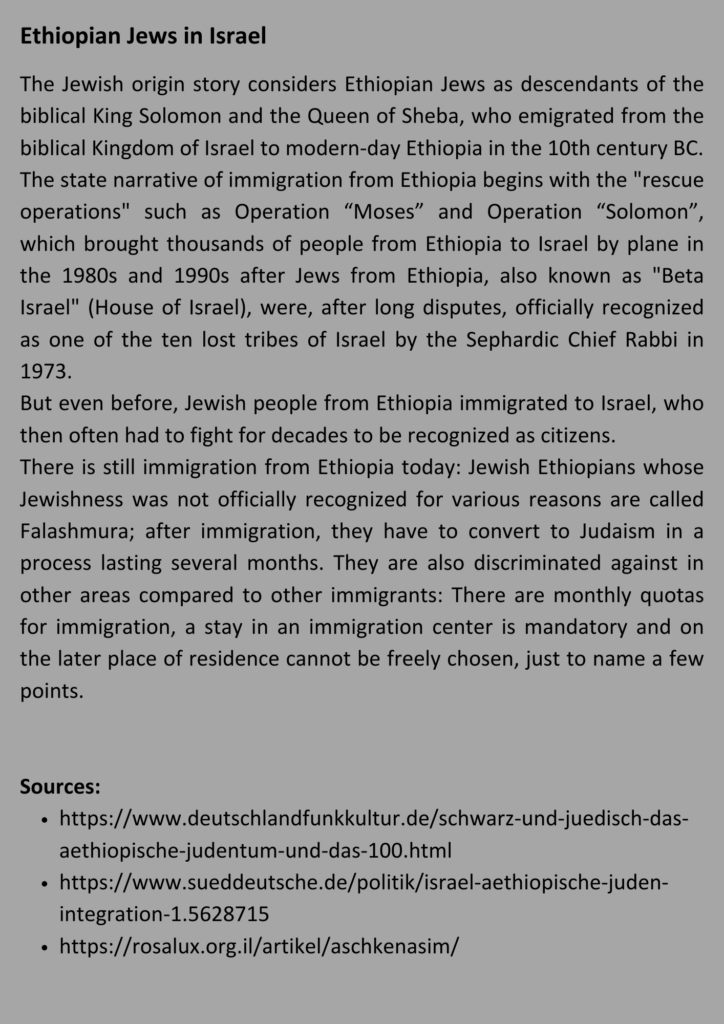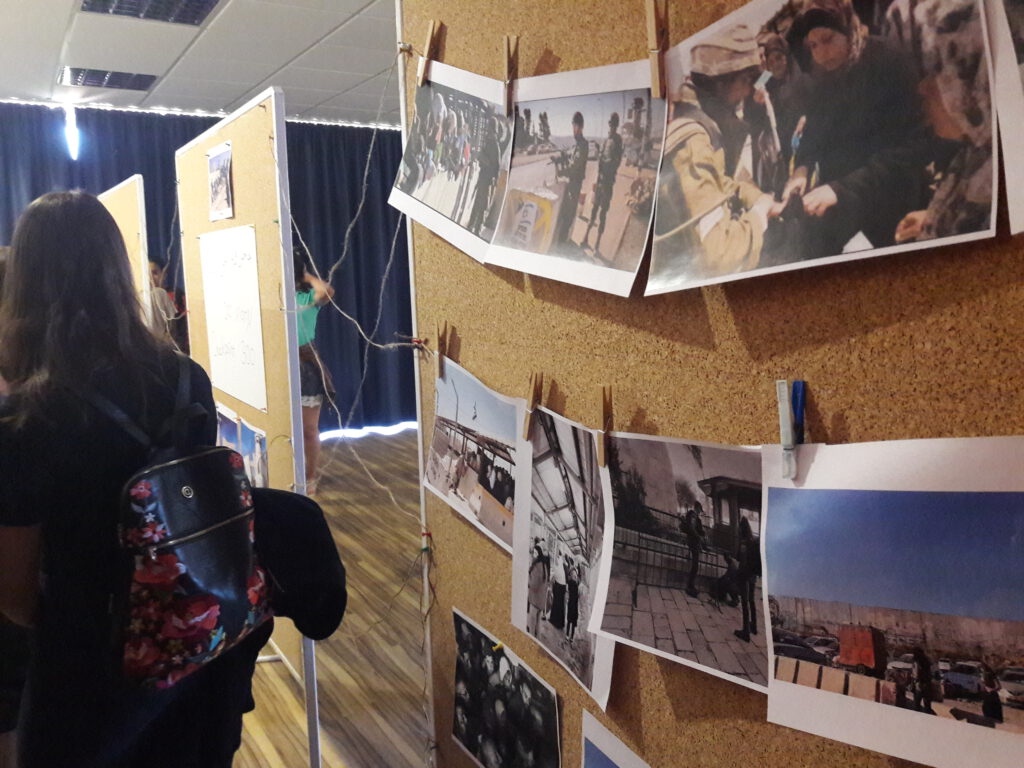Noa M.* (29) lives in Haifa, Israel. She is studying philosophy and cognitive science there. She mainly works, partly on a voluntary basis, in social and community projects and initiatives. In this interview, she talks about her family history, the situation of Ethiopian Jews, her activism and her experiences in the seminar.
TP: In the seminar you have been telling your family story – would you to tell it here again?
NM: (…) My family came from Ethiopia, when I was just a little over one year old. Both of my parents are from different parts of Ethiopia. But they met in a teachers’ training in Ethiopia in the late 80s, early 90s. There was still a communist regime. (…) Then the regime fell and they decided to leave the country in the midst of a war. My mother has a Jewish side, so we came to Israel; she has some family here. We first came to an immigrant center. Because if you are Jewish you get care, like housing and Hebrew school and stuff like that for a few years. Then you are on your own. It’s an okay city and my parents still live there. (…) I was raised in Israel in different cities. My father kept working a as a teacher in Israel after a long fight to be recognized, because Israel didn’t recognize his education. My mum gave up and worked as a secretary. But within the Ethiopian community in Israel, these are very good jobs. We are Ghetto royalty. I was known as THE teacher’s daughter because there was only one Ethiopian teacher that we heard of in Israel. (…)
We first came to an immigrant center, because if you are Jewish, you are entitled to state care, like housing and Hebrew school and stuff like that for a few years. Then you are on your own. (…)
TP: Could you elaborate a bit more about the situation of the Ethiopian community in Israel in general?
NM: Their situation is very tricky. Israel is made out of so many cultures. But the biggest ones are the Mizrachim, Jews from North African and Arab countries and Ashkenazim Jewish people who are usually from the Middle of Europe and a little bit from the East of Europe, but for the latter there is a discussion whether they count as Ashkenazim or not. The hegemony is definitely white European, even they are not in the majority anymore (…) Ethiopians make less than 2% of the Israeli population. They face a lot of the already known oppression that other Non-European Jews in Israel go and went through, but as the smallest group of Non-Whites they are very much lost in the system. They face everything the Mizrachim used to face back in the 50s and 60s, 70s even though the Ethiopian only immigrated in the 80s. Up until very recently they were recognized as submissive and quite people that do not fight for their rights (…). But there were several crimes against our community either by the police force, or the justice system and the new generation born here, they do not want to keep their mouth shut – like we have been taught within our community. And in the past 5–7 years, I think it started in 2014/15, there were a lot of demonstrations, almost riots, on how our pain is concealed and shut. We face many tragedies (…). And our Judaism was not recognized as proper Judaism for a long time because it’s old and a different sect. Our education that we got was not recognized. So, we were left alone, less than 2 % of the entire population to just drivel and die in our little ghettos. Even though my generation and those who are younger had some protests not much has been changed.

But there is more acknowledgement that Ethiopians go through a different system than everyone else in Israel (see info box), that they do not have or get the same rights as everyone else. Furthermore, many still live in poverty. Out of 2 percent of the population, we have like 0,00-something percent members of the academia. I think you can count on one hand the number of PhDs of Ethiopian people in Israel. (…) Israel sometimes takes Ethiopians as a token to show how liberal and multicultural they are, while the reality is, that the minute you can´t use them in the front, Ethiopians are in the VERY back.
TP: (…) Let’s talk a little more about the seminar. Before coming here, what was your motivation to be part of the program?
NM: (…) I am really passionate about communal and social injustices and projects that help communities (…) On a cognitive level, I am in all the struggles, with my heart, my soul and in my head. But every time it comes to meeting one of them, hearing their story, getting to know them, their name and their face – I guess I am a bit too sensitive. I would just start crying, and I am no good in a protest just crying. So, I always felt too sensitive to take part in the field level of things and I really wanted to challenge myself. (…)
The seminar helps me build courage and motivate myself – I don’t wanna say to be more radical in actions, but to be radical in thinking of how to change things even deeper. (…)
TP: Did you experience anything surprising during the seminar, something you wouldn’t have thought that it would happen in that way?
NM: (laughs) Actually, yes. (…) Because being an activist, even in activist circles you see so little representation in a way, because its sometimes really a privilege to be an activist (…). There is this very thin line between how privileged you are that the struggle is still for you and how unprivileged you are, which doesn’t allow you to take an active part because you are too busy surviving the oppression itself. So, this line leaves very little representation for the oppressed group themselves. I don’t know if it was like this during previous years, but I am so happy of the diversity, especially of the Jewish group. (…) Every single participant here (…) even the young ones the 18, 20-year-old one, they are so compassionate and caring, sharp, amazing women. I admire every single one.
TP: I am really happy to hear that. (…) You mentioned being an activist and it would be nice to hear a little bit more about it. And also, about the workshop you planned which then could not happen. What was it about?
NM: So, me and another participant were planning to talk about activism and power. (…) In all of our discussions in the group, we danced around the word of power, we said possibility, we said privilege, we said ability, we said every word besides power. (…) And I think it’s a leftist liberal anti-fascist thing, which has a good intention, but in a way is – I don’t wanna say traumatized- but afraid of power, or having power in your hand. Sababa [Okay, cool] – you don’t wanna abuse your power, but ignoring your power does no good to any struggle. Because some of especially the Jewish participants, but also some of the Palestinians are very privileged- and DO have power! And we can utilize it and acknowledge it. (…) Me and the other participants are [in terms of our activism] exactly the opposite. I do writings; philosophical, moral essays about stuff and me and some friends build an organization for black art, philosophy and culture in Israel, where we translate some black feminist articles or we write some on our own, based on our experiences in Israel. (…) We make magazines, we curate galleries, gallery talk and exhibitions, we do this kind of cognitive or more academic, cultural sort of activism. And the other participant just took all of her friends, a bunch of people and moved them to Mount Hebron to help the Palestinians with everything they need, whether it is guarding the land or their fields or having someone to document if soldiers attack, like field job. But that´s what she is good at. I wanted to do a workshop (…) about mapping your power: all the people you know, all the skills, all the people you know that could help you, how many organizations do you know that could support you. Do you know someone who can fundraise for example? Do you know someone who can do digital graphic design? (…) And then when you look in the room, even if there is only five or ten other women, you realize you have so many resources (…) and you realize you could do this together. You just couldn’t do it alone. Power is not something you should be afraid of. (…)

TP: And now you are planning to do it in a follow up meeting?
NM: Yes, probably. We have some follow up of this seminar. And I think its mandatory. We can’t just leave this thing we have built and then just finish and okay bye. (…) We have the power, we have the privilege, we have all these emotions bubbling inside of us, we have to direct it somewhere. We have to, otherwise we’ll explode. So, I would love to help in building that. (…)
TP: You told us about some more personal conversations beside the group sessions. Was there some special moment in these more personal conversations, you would like to point out.
NM: (…) I did have some [special moment] and it was with the participant from Gaza. She is a sunshine. It´s weird, how positive she is, she is amazing. (…) I don’t remember what we are talking about, but she made me feel so fucking better after some hard session and I remember her hugging a Jewish friend, telling her that she is very brave about something she shared and I thought “Are you serious? You live in Gaza. How are we brave? Who are you?”.
She was so inspiring, she is like electrifying. Uhh, it was one of the moments when I thought, if something happens to her, I will go personally and blow up Tel Aviv. I don’t know. Don’t touch her! (…) I know that her and some other Palestinians I met here – in different lives we could have been best friends, they are so nice, so cool, so beautiful, I wish they were my best friends. But we can’t. I am working for a future, where our granddaughters will be best friends, because her grandmothers are so cool. But I know we can’t be friends right now. I understand that.
